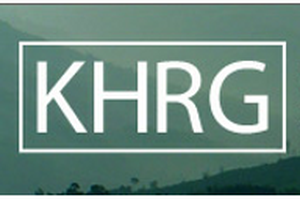KHRG is an independent local organisation committed to improving the human rights situation in Burma by projecting the voices of villagers and supporting their strategies to claim human rights. We aim to increase villagers’ capability and opportunity to claim their human rights, and ensure that their voices, priorities and perspectives influence decision makers. We encourage other local and international groups and institutions to support villagers’ self-protection strategies.
Vision
The Karen Human Rights Group envisions a future in which people in Burma achieve full human rights and justice.
KHRG Activities
- Field Research: KHRG trains community members in eastern Burma to document individual human rights abuses using a standardised reporting format; conduct interviews with other villagers; and write general updates on the situation in areas with which they are familiar. Community members are trained to summarise recent events, raise issues that they consider to be important, and present their opinions or perspectives on abuse and other local dynamics in their area.
- Report-writing: In order to directly communicate the experiences and perspectives of villagers in eastern Burma, KHRG translates and publishes the Field Research on our website exactly as it was received in the form of Interviews, Incidents Reports and Situation Updates. To ensure villagers’ voices and priorities reach influence decision makers, KHRG staff compile and analyze the field information into thematic reports, area reports or in targeted submissions.
- Village Agency Workshops: Conducted at the community level, KHRG facilitates workshops that provide a space for villagers to share their experiences and support their self-protection strategies by gaining knowledge about international human rights standards and available national mechanisms that they can use to claim their rights.
- Local and International Advocacy: By sharing our Field Research, KHRG hopes to ensure villagers’ voices and strategies for coping with human rights abuse reach decision-makers who can influence their lives. We distribute our Field Documentation and Reports to local and international human rights organisations, national institutions in Burma, United Nations agencies and rapporteurs, foreign governments and embassies, academics, journalists, and others.
Members:
Resources
Displaying 21 - 25 of 168Hpa-an Situation Update: Hlaingbwe Township, April to May 2015
This Situation Update describes events and issues occurring in Hlaingbwe Township, Hpa-an District during the period between April and May 2015, including a development project in which the Burma/Myanmar government built a new town on villagers’ lands, as well as healthcare and education updates...
Between 1981 and 1982, some of the A--- villagers fled to the refugee camps on the Thai-Burma/Myanmar border and left their lands behind. Between 2013 and 2015 the Burma/Myanmar government built a new town on these villagers’ lands and called it A--- Town...
Dooplaya Photo Set: Development projects in Win Yay Township, December 2014 to January 2015 - (photo set)
This Photo Set shows development projects including road and bridge construction in Win Yay Township, Dooplaya District between December 2014 and January 2015. These development projects destroyed villagers’ fruit and rubber plantations. Villagers report having not yet received any compensation for their destroyed lands.
'With only our voices, what can we do?': Land confiscation and local response in southeast Myanmar. - Texts, maps and video (English, Karen Burmese (မြန်မာဘာသာ)
Villagers in Karen areas of southeast Myanmar continue to face widespread land confiscation at the hands of a multiplicity of actors. Much of this can be attributed to the rapid expansion of domestic and international commercial interest and investment in southeast Myanmar since the January 2012 preliminary ceasefire between the Karen National Union (KNU) and the Myanmar government. KHRG first documented this in a 2013 report entitled ‘Losing Ground’, which documented cases of land confiscation between January 2011 and November 2012.
With only our voices, what can we do?. (video)
Villagers in Karen areas of southeast Myanmar continue to face widespread land confiscation at the hands of a multiplicity of actors. Much of this can be attributed to the rapid expansion of domestic and international commercial interest and investment in southeast Myanmar since the January 2012 preliminary ceasefire between the Karen National Union (KNU) and the Myanmar government. KHRG first documented this in a 2013 report entitled ‘Losing Ground’, which documented cases of land confiscation between January 2011 and November 2012.
The Asia Highway: Planned Eindu to Kawkareik Town road construction threatens villagers’ livelihoods
This News Bulletin describes the proposed construction of a portion of the Asia Highway from Eindu to Kawkareik Town, crossing 17 different villages and one town in Hpa-an, Kyonedoe and Kawkareik townships in Dooplaya and Hpa-an districts. The Burma/Myanmar government has demarcated the route and plans to construct the road with funding from the Asian Development Bank (ADB). The planning of the project has thus far been carried out with little consultation with local communities, who remain suspicious of such projects.


